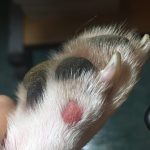Hello,
The safest thing to do is call one of the pet poison helplines. They can calculate the toxic dose based on a few questions they will ask you. Or you can call your vet for advice. There are a few “choc tox” calculators available online. But they are guesstimates at best. Better to go to the Er, call your vet or call the pet poison helpline immediately.
When is it ok to stop prednisone abruptly after the dog has received 5 days of twice per day Med? An ER doctor who gave us the med had warned us against stopping it abruptly because it could cause complications. Approximately 5-6 days later the dog had emergency neck surgery at the same facility where the ER vet worked. After only one day of rest post op, they said the dog could go home early! When I asked about the prednisone and tapering it, they said, just stop. The discharge doctor said the surgeon didn’t want him on it. I was very confused at this instruction. Does anyone understand why we were told to just stop his prednisone?
Comments
My dog ate 6 brownies left on the kitchen counter. She is a medium sized Lab mix. Will she be okay after eating chocolate?
Comments
Hi. I noticed an angry red lump on my 3-year-old Beagle’s foot, near her claw today. Pretty sure I didn’t see it yesterday. It doesn’t seem to hurt her at all. It’s not soft, but also not rock hard either. It’s not bleeding. She’s not licking it, so I don’t think it itches. She doesn’t have fleas or ticks. Her diet was recently changed from kibble to raw; not sure if it has anything to do with it, but I’ll mention it just in case. She seems to ber her normal self, NO vomitting / diarrhea / weakness. Brought her to the vet, and she was given 3 shots: dexamethasone, viccillin, and amoxicillin, and we were told to watch for the bump for the next few days. I’ve been surfing the web, and I think the bump could be histiocytoma orrrrr (God forbid) a mast cell tumor / mastocytoma. We live in Indonesia, and in the city we’re in, vets don’t really have labs where they perform tests and such. I’m losing my mind thinking about what my dog could possibly have. Please help if you’ve experienced a similar case. Pic attached.
Comments
-
Savitri N Hi Krista, thanks for your response. The bump has become smaller, drier, and much darker (like a healed wound), and I take that as a positive sign. Unfortunately, I have yet to find vets in my city that do biopsies or any kind of lab tests at all (not that she needs one right now that the bump has gotten better). I will still be on the lookout but am much less worried. Thank you again.
My friend has a cat whose eye needs to be removed. Can you recommend a surgeon that will provide this service for a reasonable price located in Maryland. The cat does not seem to be in pain.
Comments
Has anyone had a kitty that developed an autoimmune disease where their body attacks the plaque on the teeth causing extreme pain and inability to eat? I have 2 now that have developed it and have had to have all their teeth extracted. I’m having such a difficult time making sure they get the nutrition they need. Looking for sugggetikns and possibly an explanation as to why this happens to cats. I just want to make sure I’m not doing anything that caused it.
A month ago we went out of town and left our dog in the care of friend but when we came back our dog seemed lethargic and in pain. We took him to the vet who stated that our dog had hip dysplasia and he could go back to normal activity, (just not sprinting) and here is arthritis medication, but when his pain got worse and walking became difficult, we got an appointment to see a surgeon to have a hip replacement. The surgeon stated we would have to get an appointment to get an MRI because he stated that there is a problem with our dog’s spine because of the ataxia and pain. This came as a shock because of what we were told previously but that now we have to some how get the dog to an MRI specialist in the next coming days and handed us a 30 day supply of dog opiate. His diagnosis was never given but taking into account what was said to us that it may be IVDD. Is there something we could do that may make him more comfortable. I have read that he should only be restricted to a crate and let out to bathroom on a leash. Our vets on the other hand say he would be fine for a walk? We are just wondering because we do not know when the MRI facility an hour and a half away will have an opening we can take our beloved companion to.
Comments
Hello,
My 18 and 1/2 year old lab mix just suddenly lost about 50-70% use of his hind legs few days ago. The vet recommended MRI which was financially not feasible nor did I think giving him anesthesia given his age was a good idea. He sent us home with prednisone and to call back with updates. I took him to a vet acupuncturist but she said that probably won’t be very helpful. I’m going back tomorrow to see if I can convince her to do acupuncture. Boston has otherwise been a super happy and healthy dog (sans nerve sheath tumor surgery 7 months ago from which he has made 100% recovery).
It’s been 5 days and since I wasn’t told about crate rest, I allowed him to wonder/wobble short distances around the house to go potty and to/from bedroom and living room and he has fallen few times when his back legs gave out. Given his age, I just don’t think surgery is an option. If he doesn’t get better in a couple of weeks, is euthanasia pretty much the only option? How much time should I give him? I just hate seeing him in pain but my husband is on deployment and I really want him to hang on until he comes back as it was my husband who rescued our dog 16 years ago. He is currently on prednisone and tramadol. Please advise. I just cannot make any drastic decisions on my own right now but I also want to do the right thing by our loyal and loving baby. Thank you.
Comments
-
Linda Squales The preliminary diagnosis was disc issue, moderately advanced. But without mri I guess they couldn’t say for sure. I don’t know why the holistic vet didn’t want to give him acupuncture but I’m going back tomorrow and going to demand one. We did do cold laser but not sure if that’s doing anything. Given his advanced age I just want to know what the “right” thing to do is by a dog who has been so loyal through so many of our lives’ difficult moments. The regular vet (and I agree) that surgery is not really an option for a lab his age. But not sure if I want to give up on him yet especially before my husband’s return. Thank you.
Hi, and thank you for free advice. My vet isn’t available. Our 16 yr. old female cat was just diagnosed with kidney/renal issues. Changed her food and she appears to be improving. Teeth cleaning needed, never been done and breath is bad, but her condition too compromised to be put under/stress so maybe BRUSHING would help? OR Dental Fresh Original Water: Stabilized Chlorine Dioxide.0.1%, Stabilized with Sodium Bicarbonate (Baking Soda). What if any action is best? blood results attached.
Comments
-
Anne McLaughlin Yes, blood work only, attached on first question but here it is. ALB 3.0 ALP 122 ALT 224 AMY 1136 TBL 0.2 BUN 46 CA 9.2 PHOS 15.1 CRE 1.9 GLU 90 NA+ 147 K+ 4.2 TP 8.3 GLOB 5.4. Vet said blood sugar and heart rate good. Now eating renal/kidney specific food as per vet. She loves it. Since then, not drinking so much water and so much urine as before, but still drinking, eating. Phosphate binder? no. My vet had shoulder surgery, not available presently. Will find out. Also giving a pinch of collagen powder. My hope is that she is comfortable. My prayer is for healing, I believe as a Christian. I know we are all on our way from mortality to eternity. So I stand in hope for the best situation to reign. Her teeth apparently are in need of attention and I’m concerned they are further challenging her little body but vet shrugged it off like she’s on her way out anyway, why put her through further stress. This is why I thought maybe I would try working with her so that she might at least at some point allow a quick brush. Is this safe for her or would I be releasing more poison by brushing? How about water additives? attached is blood work printout and pic of Gracie. Thanks so much for all you do Krista.
I walk my 4year old Lab nightly for about 45 mins. About once or twice a month, our walks are interrupted by him becoming very uncomfortable to the point where he is rapidly panting, stops walking, sits, lays down, cannot get comfortable, constantly changing positions. On these occasions, we stop, I calmly try to talk to him, gently pet him, until he is okay to walk again. The whole episode lasts no more than 5 minutes. Then we walk home like nothing happened. I have racked my brain trying to find the common thread leading to these episodes. The only thing I can come up with is that he ate within a relatively short time before walking. Maybe 30 mins or less before walking. Usually he eats at least 2 to 3 hours before walking. Is the problem most likely related to his eating, then walking shortly after? Do you think it could be something else?
Comments
My 7-year lab mix tore her chest apart on a hose bib earlier this year. She developed a large seroma on her chest after her vet closed up the massive gash. We drained it once after the port holes naturally closed. She does not want to reopen the holes because of infection risk. To help the seroma shrink, she suggested a compression vest which I immediately ordered since I couldn’t find one locally. It will get here tomorrow. I hadn’t seen any comments regarding compression vests for seroma. Thoughts? My girl is happy aside from being a little dopey from drugs – she had an allergic reaction to who-knows-what and is on Benadryl. She’s been through so much over the last couple of weeks and we just want our Casey back to normal.












Good morning? When you were given the new instructions, did you let them know that previously you were told not to do that? It is a steroid, so there could be side effects if you stop giving it suddenly, until the body can “catch up” on production. Perhaps a phone call to your regular vet might be worth it… besides, you’ll probably need a follow up exam after the trip to the emergency ER which you can schedule when you call. Good luck?
I agree with Sarah. You are owed, deserve and paid for an answer that makes sense and is for the benefit of your pet.
Thank you both so much for your response. I think this was not the first sign we had that our experience there was not going to be a good one. Since our dog’s dc from that surgery center, we have consulted another physician to reevaluate and help recovery efforts with better medicine selection and pain control.
It is just hard for me to believe that a surgeon would not expect that stopping prednisone mid treatment would be imprudent. Further, if my dog were to have a crisis, it would be in their financial gain when I brought him back for stabilization. As I wrote earlier, this was one among other issues that came up with our dog’s post -op care. Now, I wouldn’t willingly take any of my animals there again.